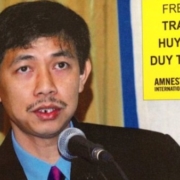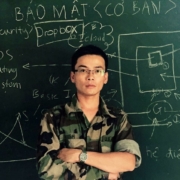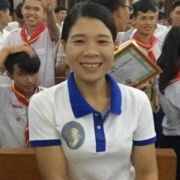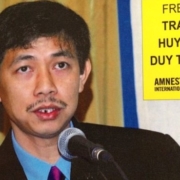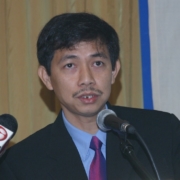Trinh Ba Phuong: A Video Portrait of the Land Rights Activist
This interview with land rights activist Trinh Ba Phuong was conducted shortly before his June 2020 arrest. This intimate video covers a variety of topics, ranging from his background to his relationship with his wife– “She’s very caring. And she doesn’t know how to lie,” he jokes– to his dreams and aspirations for Vietnam. See also the full transcript of the video, below.
Phuong is a charismatic and family-oriented person. “I think I’m pretty easy going, not the picky type,” he says when asked to describe himself. Even the public security officer who has been assigned to follow him for years says he’s a nice guy, he jokes to the interviewer. In response to the question What are your dreams?, Phuong grins and responds, “I’m just an ordinary person.” He longs for health for his family and a stable job working with his hands.
His parents, Can Thi Theu and Trinh Ba Khiem, as well as his brother, Trinh Ba Tu, are also activists. In the video, Phuong explains how his parents’ 2014 arrests launched him into the world of activism. His goals revolve around justice for wronged communities like Duong Noi District, where he is from, and Dong Tam Commune. “Ever since my parents were wrongly jailed, and our villagers were suppressed and had their land stolen, I wanted to help them get their property back,” he explains. Phuong was 19 when his parents were first arrested.
In recent years, Phuong has been harassed and surveilled by public security agents, especially so after he tried to publicly share news about the early-morning police raid in Dong Tam Commune in January 2020. The raid left Le Dinh Kinh, a local land rights leader, and three police officers dead. On June 24, authorities surrounded and stormed into Phuong’s home and arrested him; Thieu, his mother, was also later arrested at a different residence, as well as his brother Tu. They were charged under Article 117 of the 2015 Criminal Code for “propaganda against the state.” All three remain in pre-trial detention at the time this video is released.
This interview paints a deeper picture of Phuong than what observers may see through bits of his social media posts, state media articles, and the rare international news piece, and allows Phuong to tell his story in his own words. The 88 Project aims to showcase the multi-faceted lives of activists in order to press for their release and pass on their wisdom to a larger audience. We hope that viewers will understand the critical societal and personal reasons why Phuong and other political prisoners should be freed.
© 2020 The 88 Project
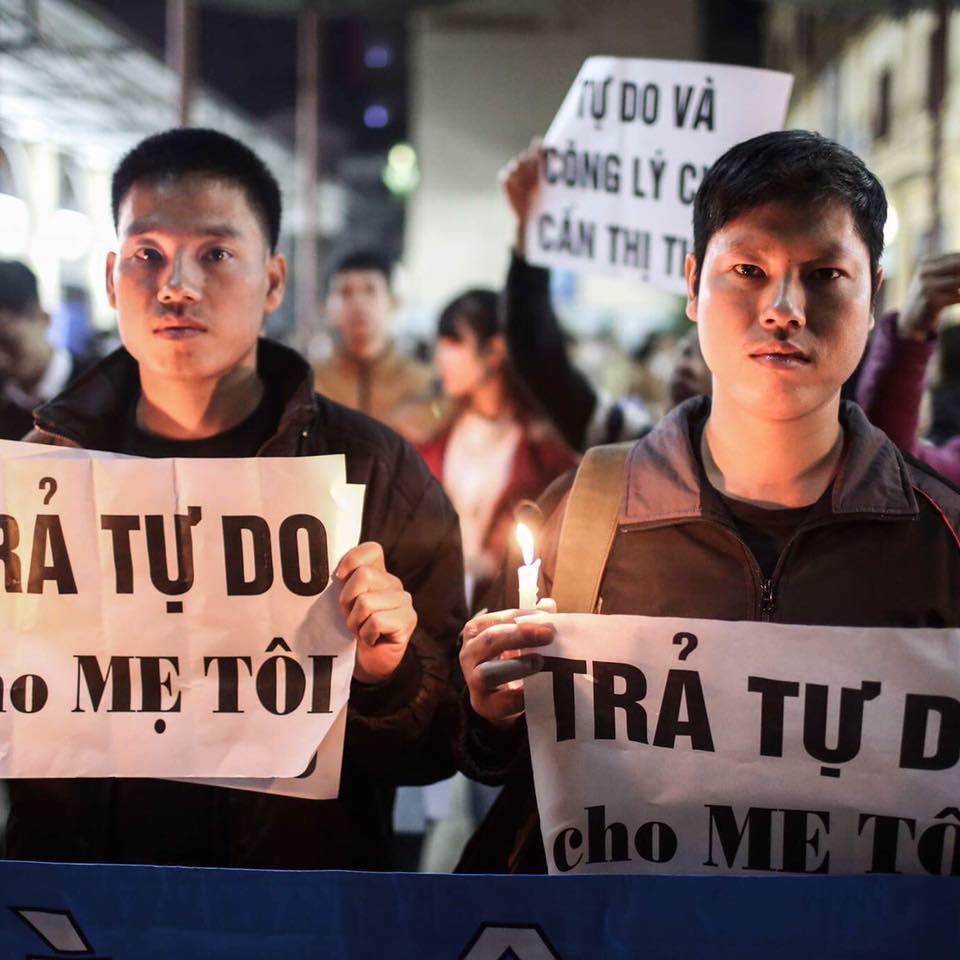
Can Thi Theu’s 2 sons holding the signs: “Freedom for my Mother” at a praying mass for victims of injustice. Source: Facebook Trinh Ba Phuong
Trinh Ba Tu and Trinh Ba Phuong (right) holding signs saying: “Freedom for my Mother” at a praying mass for victims of injustice. Source: Facebook Trinh Ba Phuong
More Background on Phuong:
In 2008, the authorities released an announcement on land acquisition in Duong Noi Village and the compensation payment, which was extremely low. There were 356 households who refused the compensation and together participated in a prolonged protest. In 2014, Phuong’s parents were both arrested and sentenced to 18 and 15 months, respectively while filming land-grabbing by the government. His mother was again arrested in 2016.
In 2018, Phuong was put under surveillance during the Lunar New Year. And in October 2019, he was prevented from leaving home on China’s National Day. Phuong was one of the most fervent supporters of the Dong Tam villagers after the raid on their village in January 2020.
He met with US Embassy officials in February to discuss the incident. While meeting with them, he also shared a handwritten letter from Le Dinh Kinh’s wife, Du Thi Thanh, with personal testimony. Phuong and Thanh both called for an independent investigation into the raid and the application of Magnitsky Act sanctions by the United States on Vietnamese government officials involved in the planning of the attack.
_________________________________________________________________________________
Trịnh Bá Phương
Farmer
Land Rights Activists
00:30 Tell us a little bit about yourself
00:35 About me… All I can say is…
00:38 When I was younger, not yet developed,
00:45 as a student, I was surrounded by a warm and loving family and
00:48 I was surrounded by a warm and loving family
00:56 and I just played with my friends.
01:00 After I finished high school, starting in 2008,
01:09 the Communist government had a land reclamation program.
01:15 I started to pay more attention to land rights and lawsuits.
01:22 Then in 2014 my parents were arrested.
01:29 Suddenly I had to learn all I could, find a way to protest
01:37 peacefully, non-violently, to get justice for my parents.
01:45 As of now, that is still ongoing.
01:50 How would you describe your personality?
01:56 There was one guy who’d been tailing me for nearly 10 years.
02:00 He’s in charge of security in the Dương Nội precinct. His name is Nam.
02:05 He said “We’ve been watching you, and we can tell you’re a nice person.” That’s coming from the security police.
02:15 As for myself, I think I’m pretty easy going, not the picky type.
02:32 I can get along with others easily. I rarely get into conflicts with my friends or with other people.
02:56 What are your dream?
03:02 I’m just an ordinary person. I have dreams which some might see as rather simple.
03:14 I wish simply that…
03:19 First of all, my family and loved ones have good health.
03:24 That I have a regular job, working with my hands.
03:34 Enough to take care of my wife and kids.
03:39 I don’t dream of anything too big.
03:48 I always tell myself to be content with what I have.
03:54 Whenever I run into difficulties,
03:57 like if my crab business isn’t smooth, sales are slow, etc.
04:05 I see that as normal. I accept the situation; I don’t let it bother me.
04:21 I realize that I still have my health.
04:25 Secondly, I have the love and care of the people around me.
04:32 And I consider that a happiness and a blessing.
04:35 What are your goals?
04:40 There are a few things that I aim for…
04:45 Ever since my parents were wrongly jailed,
04:50 and our villagers were suppressed and had their land stolen,
04:55 I wanted to help them get their property back.
05:01 And I want to see the perpetrators held accountable and punished by law.
05:07 My biggest wish right now is to tell the world the truth about Đồng Tâm.
05:16 There are many grave secrets surrounding Dong Tam that the authorities seem to be hiding; serious crimes have occurred.
05:29 All the witnesses have been arrested. So bringing that to light is one goal I’m working on.
05:41 I’d like to help others raise the issue, to fight for a Vietnam where no one will have to be in a situation like mine.
06:00 Have you ever cried?
06:07 The first time I got emotional was when I read my mother’s letter, a few days after her arrest.
06:13 The letter, titled “My parting words,” is still available online.
06:17 I did shed some tears after reading it that night
06:26 But since then I haven’t cried much.
06:36 I try to look at the accomplishments in my struggle as a source of happiness.
06:45 The joy of being able to do what you want to do.
06:51 Another time that I cried was in the police station last January 19.
07:00 I knew many villagers were detained and beaten and hurt, like Mr. Kinh.
07:07 But I thought mostly about Mr. Kinh’s grandson. Before I learned that he would survive, I was very worried about him.
07:21 Even in the police station, whenever I thought about that child I became emotional.
07:27 But even so, in front of those policemen I never showed any feelings. I had to suppress my sadness although I was moved.
07:40 And when I heard that Mr. Kinh’s grandson was saved I also became very emotional.
7:53 What are you thinking about right now?
07:58 Right now, I think about the folks suffering the most at the moment, that’s the people in Đồng Tâm.
08:09 The past few days I’ve had trouble sleeping. Sometimes I stay up all night.
08:18 Sometimes I can only sleep for three hours. Sometimes I sit up in the middle of the night. Don’t know why.
08:26 Like just the other night, I went to sleep very late. But as soon as sounds of vehicles could be heard
08:33 I woke up and sat down to write about children separated from their imprisoned parents when they were still were nursing.
08:42 As soon as I woke up I picked up my device, I started writing.
08:46 I don’t know why I have that urge, but I wanted to share the stories of those separated children.
09:04 How do you balance work and family?
09:10 I try to be organized so that I can do my job well. Besides the time for work, I try to focus on my activism.
09:26 I try to learn from others and search for information and knowledge about activism.
09:35 I manage my time so that my work is balanced and not disrupted.
09:42 Are you a farmer, a crab seller, or an activist?
09:48 When I was a child, my main job was farming. But after we lost the land I switched to selling things.
09:59 So you might say I’m a peasant. Mostly I’m a laborer who works in agriculture.
10:12 I’m essentially a farmer. I really don’t think of myself as an activist, because I don’t think I have enough ability or knowledge yet.
10:31 What would you like to say to the security police?
10:37 At the police station many times I told security police,
10:44 I advised them not to do anything cruel or bad. I reminded them of the old saying “Mandarins come and go, but the people are permanent”.
10:57 So they should look at examples like Poland or other former Communist countries.
11:09 There are former Communist cadres who are still being hunted by the new government. I warn them that whatever they do will be remembered by the people.
11:32 What do you do when facing danger?
11:38 There were times when they lunged at me as though to beat me up. But I remained calm and stoic.
11:43 I didn’t look down but straight into their eyes. I stared at them until they had to turn away.
11:56 I never blinked when staring into their predatory eyes.
12:05 There were a few times when they hit me. But my principle is nonviolence.
12:17 I practice peaceful resistance, so no matter how they hit me, I didn’t respond.
12:29 When they had a look in their eyes as though they were about to kill me, I just looked straight in their eyes as if to say
12:40 you can do whatever you want. But if you want to intimidate me, that’ll never work. That’s all.
12:50 What’s special about the people of Duong Noi?
13:02 Most of them are just simple farmers. They are caring and down to earth.
13:10 They wear their hearts on their sleeves.
13:14 They’re not afraid to stand by me. We’re united even though we know this struggle is dangerous and not simple at all.
13:30 In recent years many victims have been beaten and died in police stations.
13:35 Many Duong Noi villagers have gone to jail simply for protecting their land peacefully and lawfully.
13:44 Up to this point the community is still strong and united.
13:48 The way I see it, I’m very proud that these simple farmers can do something like that.
14:04 What’s your view of the Dong Tam villagers?
14:10 Before, I had few interactions with them, maybe a few phone calls.
14:19 I started to pay more attention because we share something in common: we’ve both lost our land.
14:37 My thinking changed on January 9, when I heard the sound of their crying over the phone.
14:43 The wailing, the cries for help, the news of the child that had to be hospitalized due to teargas… That’s when I began to pay attention
15:12 and wanted to do as much as I could, because of those things.
15:20 And when at last I heard Mr. Le Dinh Kinh had been murdered so savagely; and his family and the Dong Tam villagers were shot or arrested.
15:33 Now I feel like the whole village has nowhere to turn to.
15:41 So I want to add my humble effort, do whatever I can to help them.
15:49 That one day when the police detained me, they beat me up pretty badly.
15:59 They used all sorts of trained techniques, such as kneeing me in the face, choking me, and punching me in my head until it bled.
16:07 I was in there for 20 hours. I felt so bad for the people of Dong Tam. I felt so helpless because there wasn’t anything I could do.
16:24 Had they arrested me and given me a harsh sentence or tortured me, I would have felt a sense of solidarity with those villagers.
31:37 I wouldn’t have felt so bad having to witness those things without being able to do anything about it.
16:52 However, there has been a lot of news coming out of Đồng Tâm which I did share widely to let the world see how criminal this regime is.
17:05 I think I’ve done all I could up to this point.
17:18 If they arrest me now I have no regrets.
17:25 I’ve done pretty much all I needed to.
17:32 What’s your mother like?
17:39 In day-to-day life she’s very attentive to her children, to the family and our neighbors.
17:49 I knew that before, but I didn’t understand it fully. It wasn’t until I had a child of my own that I understood how deep is the love of parents.
18:02 I see that my mom cares for me a lot. But even though my parents love me very much, they also support my activism.
18:19 My own parents became activists themselves and were able to overcome the common psychological barrier.
18:28 Usually in a family only one or two people would be activists. Or if the parents are activists then the kids fall back so as not to make the parents worry.
18:37 But my parents were able to overcome that typical mindset. If I was to be arrested or killed, like they killed Mr Kinh,
18:52 my parents would be willing to accept that. Once you accept to fight this way, you must accept all the pain it brings,
19:03 Even the pain of a parent losing one’s own child. To prepare mentally for something like that is not very easy.
19:14 Perhaps it’s not easy for my mother, either. But because my parents have overcome that, it gives me a lot of confidence in my fight.
19:29 And I don’t feel as much pressure. That’s something I think about often.
24:23 What if you go to prison?
19:45 I’ve often thought I might get arrested someday.
19:49 I have thought about how my wife would worry about me very much if I went to prison.
20:02 I’ve also thought about how much I would miss my baby.
20:08 If I didn’t see him even for just a couple of days I would miss him already.
20:13 I really don’t know what kind of a feeling that would be. But those are some of the things I have thought about.
20:25 But as far as my activism goes, my wife supports it. And my family too.
20:33 There’s really no problem from them at all.
20:43 What have you prepared for prison?
20:48 I prepared for that several years ago already, it’s not just now that I’m thinking about it.
21:02 I have also prepared several video clips; they’re like my will, almost.
21:09 Things I wanted to leave for my family and the villagers, telling them what to do just in case.
21:18 First of all, don’t let the person inside prison be too concerned or those on the outside to be too worried.
21:25 If I go to jail, no matter how I fare, I don’t want others to be too worried about me.
21:30 Otherwise, if the ones inside worry about those outside and vice versa, that’d be very exhausting.
21:42 I have sent all those video clips to various media groups, including international organizations.
21:51 If I get arrested they can show those clips to the public. In them I also said that I wouldn’t admit to anything, not until my lawyer is present.
22:14 If any clips or any confession of mine appear on official state media before I have a chance to see a lawyer,
22:26 even in police files,
22:30 then for sure I must have been tortured to confess. Or they could have used something more modern such as a drug that numbs your brain
22:46 and causes me to say things that are disadvantageous to me.
22:54 What if you’re sentenced to, say,10 years in prison and then people campaign to get you out of the country?
23:02 I haven’t thought about going to another country, so I don’t know what to say.
23:12 Sometimes when I’m in danger people have told me to consider leaving. They get worried.
23:29 My current thinking is I’d stay. I’m willing to go to jail. I haven’t thought about going to another country.
23:39 If you weren’t an activist, what would your dream be?
23:44 My wife and I have often talked about that, ever since we got married.
23:56 We could just have a simple business or farm, no need to be rich, just be healthy and have enough to eat.
24:22 If we have more than enough, we can do charitable work for needy children.
24:38 My wife and I talk about that often.
24:48 Talk about your wife.
24:52 A few days ago security police threatened to arrest me and VTV broadcast about it.
25:00 They used pretty serious terms to refer to me, like “agitator against the state”…
25:06 I told my wife to mentally prepare so as not to get caught off guard.
25:13 I asked her not to put too much emphasis on life or death.
25:17 The line between life and death is so fine. So death shouldn’t be something to worry much about, let alone prison.
25:28 She said she understood and supported me.
25:32 But in truth she is still quite young. She was born in 1999.
25:36 So she’s still quite fragile. She just listened and cried.
25:44 But she agreed to let me continue the fight. Dong Tam is the latest issue I am fighting for.
25:55 When she heard about what happened to Mr. Kinh’s grandson she cried a lot. She’s very emotional.
26:06 I don’t think we have any conflicts when it comes to my activism.
26:19 We have a mutual understanding.
26:23 She has a strong personality. She’s barely 20, yet she can handle all these challenges from her husband.
26:40 I think she’s quite strong to be able to overcome all that.
26:44 Secondly, she’s very caring. And she doesn’t know how to lie.
26:56 She’s very emotional. Like when our little dog died, she cried her heart out. When she sees children that suffer, she cries. Those are the most precious things about my wife.


